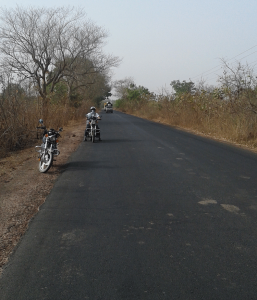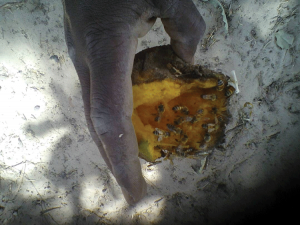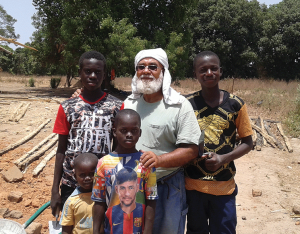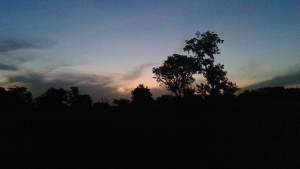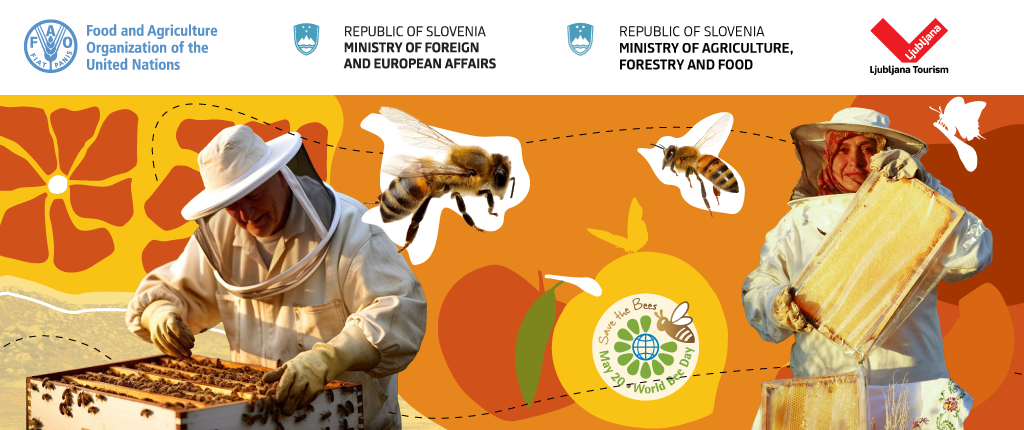By: Abu Bakr Ladd
African Bees Make Honey From Magic Trees.
“And thy Lord has inspired the bee saying, ‘Make thou houses in the hills and in the trees and in the trellises which they build.’ ‘Then eat of every kind of fruit, and follow the ways of thy Lord that have been made easy for thee. There comes forth from their bellies a drink of varying hues. Therein is a cure for men. Surely, in that is a Sign for a people who reflect.’” –Holy Quran Chapter 16 vs 69-79
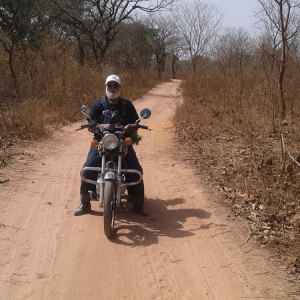 A few years back, I rode a small 150cc motorcycle from Ouagadougou, Burkina Faso to Dakar, Senegal. Somewhere in Mali I wanted to get some water from a local water pump that was surrounded by a goodly number of bees. These bees were not very large and did not seem particularly aggressive as the local people went to fetch water and the bees did not seem to bother them.
A few years back, I rode a small 150cc motorcycle from Ouagadougou, Burkina Faso to Dakar, Senegal. Somewhere in Mali I wanted to get some water from a local water pump that was surrounded by a goodly number of bees. These bees were not very large and did not seem particularly aggressive as the local people went to fetch water and the bees did not seem to bother them.
So when I approached the pump and started the pump handle, one bee landed on my arm, I just wanted to brush it off and as I did so, it stung me. The pain was pretty intense, but bearable and I thought it would abate after some time. However, the arm began to swell and by the next day, my arm was swollen considerably and the area of the bite, extending perhaps five to six inches from the original sting site was very hard and very painful. This was my first encounter with African bees. I used the word “killer” in parenthesis to indicate that the word has to be taken with a large grain of salt.
The bees are harmless and will go about their business and co-exist peacefully with humans – unless provoked! You can see my friend Daouda Tamba handling them as they drink water and he is holding a half eaten mango which the bees are also enjoying. In short, these bees are like any other bees and will not attack humans under normal circumstances. The fact that they will inevitably wipe out the local bee population is a given, so long as the current climate change that is taking place continues northward. Of course there are still people who doubt that a climate change is occurring and evidence to the contrary will not persuade them otherwise. But I digress.
Of course when provoked, that is where the problem becomes not only serious, but life threating and in most cases will result in death.
My friend in Senegal, Daouda Tamba, is quite familiar with these bees and explained to me in great detail how the bees operate.
When threatened or alarmed, the bees give off some type of signal which alarms the hive and they spring into action. If the danger comes from a human being they will of course sting the person, but the majority will circle around his head. The person will be running for his life and the sound of dozens or more angry bees swarming over your head is something that cannot be explained but has to be experienced to be properly understood. Not many have survived to tell of the experience, although some few have.
Eventually the person running will exhaust himself, and by eventually we are not talking of a very long distance. A few hundred yards at best, keep in mind that the person is continuously being stung. As the person collapses and falls down the swarm above his head will attack his nose, eyes, lips and neck. Within 30 minutes to one hour this person will suffocate due to the intense swelling of his nose and mouth.
These bees are known to have killed horses, cows, oxen, and goats when somehow these get in the way or have provoked a nest.
It is also not a good idea to swat at individual bees, as they give off a odor in death which signals alarm and will bring other bees to come to their aid and attack. Everyone knows that bees have an uncanny system of communication which tells the other bees where the water supply or good nectar is located. This same system informs them where the enemy is and they will come to attack the source of the danger communicated to them by their dead comrade.
A few years ago, in Bignona, in the Cassamance Region of Senegal, a local person brought us four buckets of honey. Within minutes of his arrival with the honey a single bee entered the house through one of the windows. After five minutes of the first bee, there where dozens of bees in the house. You can believe that we were alarmed because pretty soon the house was swarming with bees. My friend Daouda cautioned me not to strike or try to swat any bees. And there was definitely some fear in his voice and manner. He carried the buckets into a foyer that could be closed off and pretty soon the bees left the sitting room that we were originally in and migrated to the foyer. However bees were still coming. We had to leave the windows open so that after making their inspection and finding out that there was no longer any honey, or perhaps they had been informed that the honey had been moved, they no longer came. The other saving grace is that before sunset, they depart to return to their hive. We worked all night to clean the buckets, remove the honey, mopped the floors and did our best to remove all traces of honey and sealed the stored honey in a room with sealed lids and a locked door.
The bees came back early in the morning, but not being able to find the honey they departed after some time.
Here, I think it appropriate to tell a little about myself and my interest in bees and honey, and in particular African Honey Bees. You noticed, I hope, that I said “honey” bees and not killer bees. I would posit that these African Honey Bees are the original bees and retain within them all of the genetic traits that made them successful in their original environment.
That fact that these bees are more aggressive may well stem from the environment from which they evolved. There were infinitely more enemies and prey in the jungles and savannahs of Africa than in the fields of Europe. Naturally, this required a defense which would fight off even the most aggressive and larger animals, and all manner of other critters that love the sweet taste of honey.
I have always been an adventurer of some sort or other, mostly during my younger days when I hitchhiked to India from Germany and from The Gambia to Europe across the Sahara desert. Needlessly to say, I have hitchhiked all across the U.S. from Missouri to California and North to Canada and South to Mexico. Why hitchhike you ask, well I never had much money and the burden of getting bogged down in some remote place with no spare parts seemed to much of a burden to me. Also, when you travel on foot, you meet the people and become intimate with the country that you otherwise could never do. Staying at the Holiday Inn in Marakesh is not the same as staying in a shepherd’s hut in the high Riff Mountains.
After retirement as a “handyman,” that’s what my wife claims I am, I decided that sitting in front of the TV getting fat and stroking out was not for me. So I volunteered to work with an organization called Humanity First. These good people provide a range of services in the U.S. as well as in many countries in Africa and Asia.
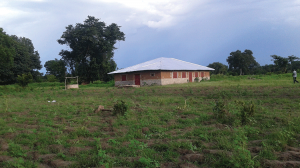
My house built from mud bricks, powered by two 140-watt solar panels and two 150-amp hour battieries.
I volunteered to serve in Senegal where I built a small house mostly out of mud and indigenous materials and ran it off of two 140 Watt Solar Panels and two 150 AmH batteries. I also had a 250 Watt panel to run a DC Submersible Lorentz pump that supplied water from my hand dug well. (I didn’t dig it, a local contractor did) I had a few chickens and a small garden and the idea was to show local people how to maximize their available resources.
In short, my main effort was to improve the economic condition of the local villagers. I won’t go into detail to explain how poor these people are – unless you have been to some remote villages in West Africa you cannot understand. The struggle to eat everyday is real. Amazingly, prior to the advent of the Europeans arrival, food was no problem, but due to the machinations of the IMF, now people buy imported rice instead of growing their own. Money is now the most important thing and of course people do all sorts of things to earn enough money and the young people aspire to become taxi and truck drivers and to own motorcycle “taxis” instead of farming. Everyone has a cell phone and slick Chinese clothes with designer labels.
In the search to find a way to increase the productivity I came across the local honey of the Cassamance. Cassamance is a region of Senegal which is more tropical than the mostly arid North. Neem and Moringa trees and others which I cannot name are in abundance and it is from these trees that the bees gather their honey.
The verse from the Holy Quran which I have quoted has specific and esoteric meanings. But what is clear is that according to the Holy Quran the drink that comes from their bellies has a cure for humans. Interestingly, the West Africans do not buy this honey to merely sweeten their tea or coffe, but rather see it as a medicine for a variety of ills.
According to the Neem Tree website: Although relatively unkown in the U.S., Neem is a cornerstone of the ancient Ayurvedic health care system and is one of the most widely used medicinal herbs in the world. Americans, however, are more likely to recognize Neem as an EPA registered pesticide that’s non toxic and has no adverse effects on beneficial insects, including bees.
I have first person testimony from people who claim that Neem cures all sorts of ailments and Neem oil, and Neem plants are used for many local remedies. The honey produced by the bees from the nectar of the Neem trees is quite strong and has a taste that most Americans will be unfamiliar with, however, no one who has ever tasted Neem honey will deny the immediate impact that a spoonful of Neem honey has.
Which brings us to the Moringa tree. The botanical name is Moringa oleifera, but in West Africa it is better known as “Neverdie.” That is, if you use the leaves and roots of this tree you will never die, or at least live a very long life.
There are many claims for Moringa, but most agree that Moringa has 7X the vitamin C of Oranges, 4X the Vitamin A of Carrots, 4X the calcium of Milk, 3X the pottasium of Bananas and 2X the protein of Yogurt.
Please do your own research on these incredible trees and once you have done that you will better understand the verse from the Holy Quran quoted above.
They say that it is not polite to discuss Sex, Politics or Religion in polite company, but whoever said that is a fool. These are the issues that LIFE is about. Indeed, I would claim that it is most essential that these issues are discussed. My point is that the so called African “Killer” bees are immigrants just as the Africans, the Mexicans, the Ukrainians, the Pakistani and Indians and all the rest, are immigrants. They are and will be a fact of life, regardless who likes it or not. You can no more wipe out the millions of Immigrants in this country than you can wipe out these so called killer bees. They are here to stay.
As previously mentioned, the obvious climatic changes are pushing these bees further Northward and to the West. The real question is how will we co-exist with these bees and how can we take advantage of their many beneficial properties which some Great Beekeeper in the Sky has ordained them with?
In the final analysis, these are political questions. Will the American people continue to elect officials into office who are detrimental to the land and Nature? These are political choices of the people of America. The continuation of an Agricultural System that poisons and pollutes the land and produces bland, tasteless food that has no saving grace, except that it travels well is nothing short of insanity. Here, in Saint Louis the Cancer Hospital is growing by leaps and bounds and when you ask the learned Doctors where is all this cancer coming from they shrug and say that they don’t know. Physician – Heal Thyself!
Let me conclude by making what I believe is the only obvious and logical solution.
We have to learn to understand the language of the honey bees and their nature and live in harmony with them. They will provide us with many benefits. As someone said, you would not want to haul flatbed loads of them up and down the highways. If you stop poisoning the land, the indigenous bees will come back and eventually mate with the local ones and the problem will be solved.
The other thing is that since the U.S. is now importing more than 180 million kilos of honey per year from other countries, and as this number is only likely to grow, you might consider importing some of this wonderful honey yourself and reap the health and financial rewards that this honey brings.






